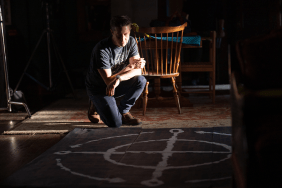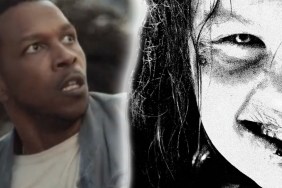A look at William Girdler’s fantastic and notorious The Exorcist rip-off Abby
Okay, the title of this piece is pure hyperbole, designed as it was to get you to click a link and lock your eyeballs to my words. And if you’re doing just that… it worked!
No, 1974’s lurid blaxploitation effort Abby is not quite worthy of erasing William Friedkin’s masterpiece from your memory, but it is most assuredly a magnificent little picture, a movie that openly steals from its blockbuster source but has more than enough distinction and eccentricity to function as its own entity.
Shame then that it’s also one of the most ill-treated pictures of its period. More on that later.
Abby was lensed it Louisville, KY by noted B movie auteur William Girdler, a man who made a mess of lovely movies that rode the tails of other movies (If you liked Jaws, you’ll LOVE 1976’s Grizzly! And if Abby wasn’t enough of an Exorcist riff for you, try Girdler’s 1978 mind-blower The Manitou on for size!) but always came armed with real enthusiasm and sense of cinematic craft. Girdler’s movies are almost across the board well-written and stylish and, best of all, take themselves seriously. It’s a shame we lost this talented director so young.
Recently we rhapsodized about the great actor William Marshall and his grace and magnetic screen presence in 1972’s unforgettable Blacula. For those looking for more essential examples of Marshall’s intelligent and articulate work in trash movies, look no further that Abby. Here, Marshall plays an educated Bishop who travels the world studying arcane off-shoot religions and is an expert in demonology. When we meet him he’s visiting his beloved son Emmett (Terry Carter) who himself is a Louisville-based minister and is married to the lovely Abby (the amazing Carol Speed from The Mack and many other ’70s flicks) who is sophisticated, kind, pious, hard-working and talented; a singer in the church choir (in fact Speed wrote the song she sings in one key scene) and a newly-minted marriage counselor. Emmett and Abby live together in a nice house with her mother and older brother and their life is happy, healthy and full of love and life.
And then, of course, the darkness comes to call.
Under cover of night, a malignant force creeps into the family home, up the stairs, through doors and keyholes and chooses Abby as its vessel. In one of many astonishing sequences, Abby feels the first calling of her new otherworldly possessor and begins furiously masturbating in the shower, when a dark shadow seems to come at her from behind to finish the job. Indeed, Abby’s possession is one propelled by sexuality, which I guess might add some sort of element of discussion for select viewers looking to politicize the picture. But I think that’s an easy and misguided mark. Look, Girdler and his crew were simply ripping off The Exorcist and capitalizing on the new demand for black genre films. If Linda Blair shagged a crucifix, these cats were going to have their devil-girl shag, well, everything!

Almost immediately Abby stars going through the sort of Mercedes McCambrigde growling and goopy barf spewing antics that are now tired and commonplace in the endless glut of possession films but in 1974 still had the edge of something shocking. Her mother is leveled and her husband cries freely watching his beloved wife, the center of his universe, spiral out of control, becoming abusive and violent and generally f**king insane. It’s certainly a kick to see Speed just go for it in these wild scenes, but what makes them most effective is in fact the family’s reaction to the madness. Again, this is a tight, loving, God-fearing brood. They walk “the path.” They are good people who do good things and only want to continue to do good things. So for such a cancer to suddenly appear and tear their unity apart is shattering to them emotionally and physically. Then again, The Exorcist at its core was about this too. Never mind the Catholic angle, that film is really about a mother trying to save her daughter and hold on to her own sanity as the unthinkable envelopes her carefully controlled world. Like Ellen Burstyn in that film, Carter’s performance here is 100% believable. His Emmett keeps trying everything to get his love the help she needs and when nothing works, he’ll stop at nothing to convince people (including Battle for the Planet of the Apes‘ Austin Stoker) that there just might be darker forces at play.
Re-enter Marshall, whose grandiose and dignified presence props Abby up to even greater heights in the final reel, after we’ve seen Speed essentially torment the innocent and have endless sex with every miscreant bar-crawler she can lock her legs around. In fact, the climactic and inevitable exorcism scene takes place IN a greaseball bar, something I’ve never seen before. It adds an element of urgency and kink to standard sequences that more often than not happen within the stained-sheet sanctity of the possessed person’s bedroom.
RELATED: Actor Ron Faber Remembers The Exorcist
Girdler wielded a deft hand when it came to cheating his budget and this film is a great example of his abilities. First and foremost the sound design is overwhelming, with screeching noises, cries, breaking glass, twisting metal, howling winds and all manner of sound FX pummeling the audience and creating a pretty terrifying aural assault. Savvy viewers will recognize some of the sounds in Abby’s soup as appearing in other films too. The “howling” sound is most assuredly borrowed from Gordon Hessler’s Cry of the Banshee (also distributed by American International Pictures) and key screeches can be heard in later films like Fulci’s City of the Living Dead and Tobe Hooper’s Lifeforce. The director also exploits Robert O. Ragland’s soul music score to great effect, draping it all over every inch of the picture making even the most mundane and cheaply shots sequences feel exciting and alive.
The distribution woes of Abby are near mythical at this point. Almost a full year after AIP had released the film, Warner Bros. decided that they were not terribly keen on downmarket movies like this and the Italian gem Beyond the Door trading on their juggernaut horror movie’s legacy and came after them legally to remove the film from circulation and essentially bury them. Since AIP had already made their nut and more besides from the film’s success, they shrugged and complied and poor old Abby was left unseen for a long time. in 2003, fledgling distributor CineFear released the film on DVD in a version they claimed was digitally restored and remastered and other such fabricated nonsense. The transfer was in fact struck from a battered (and I mean battered) 16mm print, completed with blown-out color and flickering pubic hairs in the frames. I remember back when I wrote for Rue Morgue magazine being aghast at this release and my reviewed reflected my shock. And I wasn’t alone.
But all these years later and still there is no known pretty release of this wonderfully filthy film anywhere. In fact, no one even knows who owns the rights or if the Warner fascists ordered the negative and all prints decimated. Whatever the case, fans WANT this move and so far no boutique label has answered the call.
But for now, you can watch Abby on YouTube and other such bootleggy sources (and there are other DVD’s, all struck from that CineFear version) and even though it looks like Hell, it’s still watchable. You’ll still “get it.” And get it you should. Abby is easily one of the best films of its kind and probably the greatest of the many The Exorcist rip-offs out there.
Abby 1974
-
Abby1

-
Abby2

-
Abby3

-
Abby4

-
Abby5

-
Abby6

-
Abby7

-
Abby7_0

-
Abby8










